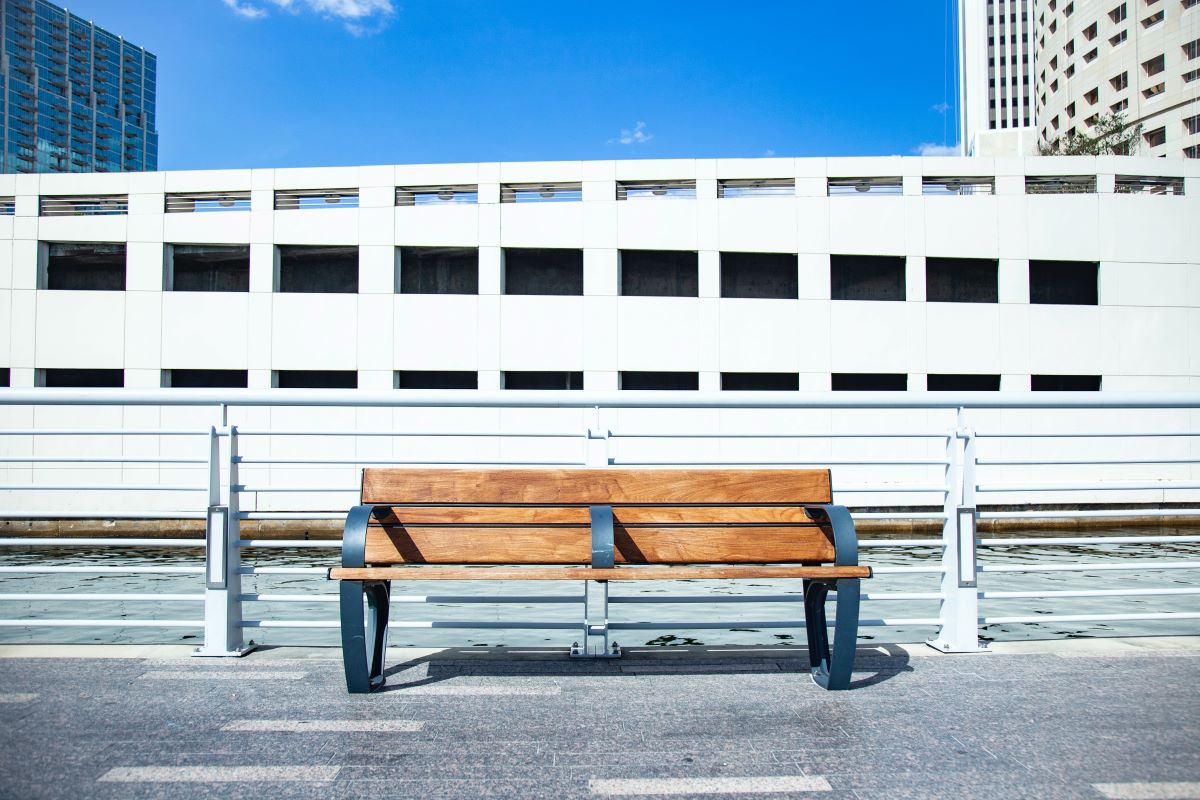Small Annoyances Designed to Maximize Profits Really Add Up to Making the Lives of Homeless People Even More Unbearable
Intro to marketing teaches the concept of making your business comfortable enough that people don’t complain but not so comfortable they want to linger. This is especially a concern for restaurants, who want to flip tables quickly and get more paying customers in the door rather than host people lingering in conversation over their last cup of coffee. Bright colors, loud music, and seating that’s just comfortable enough are some of the common tactics businesses employ to keep people moving and profits high.
This isn’t something we typically notice when spending only a few hours a day in these spaces. But every minor annoyance like this is magnified for unhoused people who rely on these spaces as a lifeline. When you have no home to retreat to, the constant blaring of music, bright lights and colors, and the inability to sit or lie comfortably for days or weeks becomes an assault on the senses.
Is It Really That Big of a Deal?
Those of us who spend a maximum of a couple of hours out of the day navigating public or commercial spaces like this may still be struggling to see how all this affects someone in these spaces nearly 24/7.
One simple example to underscore what this feels like is to remember the last time you laid down. Whether on the couch after work, in bed this morning, or on the floor roughhousing with the dog, it probably wasn’t too long ago. And it was relaxing, right? With no fear of being watched, approached by a stranger with unknown intent, or being forced to move along?
For unsheltered people, just finding a space to lay their body down horizontally and not have the cops called on them for it is an eternal struggle. Depending on your situation and location, it may be days or weeks before you’re in a spot where it would be socially acceptable to lay down and just rest for a while – to stretch out all your muscles and relax them, letting your whole body be supported at once.
Stealing a few moments of shuteye while sitting on a bus or in a coffee shop can never compare to the restorative power of laying down for a night of sleep. And this is just one example of how the lack of comfortable public spaces can affect a person!
Why Is Everywhere Like This?
A big part of the problem in the United States is that we need more truly public spaces. The “public” spaces we usually think of are often private businesses open to the general public. This means that their environment is carefully crafted not to encourage the well-being of those using the space but simply to enhance profits.
For large businesses, these decisions are decided by focus groups and intensive testing miles away and filtered out to locations across the nation. People’s actual needs in certain communities never factor into the decision-making process.
Even the few truly public spaces we have left are increasingly policed and made hostile to unhoused visitors, who are also part of the public and entitled to use those spaces just as much as anyone else is.
Parks install benches with “armrests” designed to keep people from lying down on them. Libraries employ security or police to wake and eject people who fall asleep after hitting the books a little too hard. Encampments are swept from sidewalks and beaches to prioritize the casual user’s needs over those with nowhere else to go.
Having available public spaces that were actually comfortable would benefit all of us, whether we’re housed right now or not. These “third places” are vital for fostering community, exchanging ideas, and building relationships with people outside our homes or work environments. They’ve been severely lacking in American cities for quite a while now. Still, we’re not seeing much mobilization surrounding it for much the same reason we were all content to watch public bathrooms disappear.
In general, we’ve shown ourselves to be quite willing to sabotage our well-being and comfort as long as someone else has it worse.
Where Do We Go from Here?
Comfortable public spaces designed to meet the community’s specific needs are invaluable for unhoused and housed people. If we want more spaces like this in our towns and cities, we’ll have to petition our legislators and let them know we’d like more spaces set aside for public use.
We’ll also need an attitude adjustment when it comes to housed people feeling like they have more of a right to be comfortable in public spaces than unhoused people do.
Right now, a housed person being uncomfortable with the mere presence of an unhoused person in a shared space is enough to have the unhoused person ejected with nowhere else to go. Challenge yourself to extend a little more grace and compassion to your neighbors and remember that they have an equal right to the space. Remember that weird is not the same thing as dangerous. And if you see someone doing an activity you think seems odd or out of place, it’s most likely innocuous and won’t affect you in any way.
Maybe you would never wash your face in a library bathroom and find it strange if someone else did, but you can simply mind your own business.
And if you can’t do any of that, if you’re in a public space and feel the rising need to dictate what other people can and can’t do there, even when it’s not hurting anyone else- remember that you have a home to go back to where you can lock the door and forget any of this ever happened. Go there.











